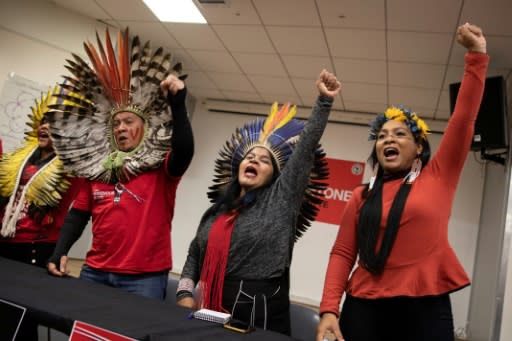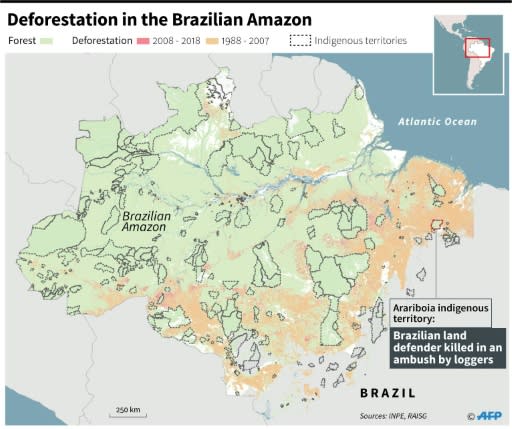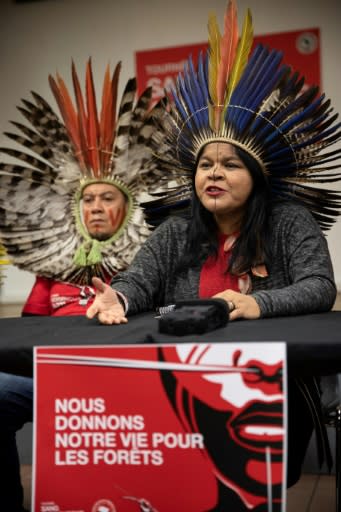Indigenous leaders urge EU to protect forest homeland
Brazilian indigenous leaders pleaded Tuesday with European lawmakers to protect the Amazon and the communities living there, warning that the West's insatiable appetite was risking the health of the planet. The leaders were in Paris as part of a five-week, 12-country tour of Europe, having met with the Pope last month. They are calling on EU governments to ban the import of products grown on contested or forcibly seized indigenous land. "We can no longer manage to fight this battle alone," Sonia Guajajara, coordinator of the Association of Indigenous Peoples of Brazil, told journalists at the International Centre for Popular Culture (CICP) in Paris. Illegal loggers who infiltrate indigenous land to poach timber have become a threat to the people there. More than 100 tribesmen under the name "Guardians of the Forest" patrol the territories to protect the land from these gangs. But last week, guardians Paulo Paulino Guajajara and Laercio Guajajara were ambushed by loggers as they patrolled the Arariboia territory in the northeastern state of Maranhao. Paulo was killed in the attack. "Our brothers are dying," Terena told AFP. "We are losing our environment in the name of the market." European consumers could play their part by demanding to know the origins of the products they purchase, and ensuring what they buy is certified deforestation-free, said Terena. - 'Markets killing our homes' - The Amazon rainforest is one of the most crucial regions on Earth for biodiversity and vital in absorbing millions of tonnes of planet-warming carbon emissions each year. But it is being ravaged by agriculture, logging and wildfires. Extensive cattle farming is the main driver of Amazon deforestation, with just over 65 percent of deforested land now being grazed, Romulo Batista, a researcher at Greenpeace, told AFP in August. Brazil is the world's largest exporter of beef, sending 1.64 million tonnes to markets worldwide. The European Union is the third largest importer. Other crops cultivated on deforested land include soy and sugarcane -- ingredients in many common food products in supermarkets across the world. "The markets are killing our homes," leader Alberto Terena told AFP. "It's everybody's house -- everybody need this forest to breathe." "Society must stop consuming in this way," said Guajajara. Concerns over the health of the Amazon -- commonly referred to as the "lungs of the planet" -- have intensified since far-right president Jair Bolsonaro took office earlier this year. He has rolled back a series of environmental protections, attracting international criticism when thousands of blazes tore through the rainforest in August. Earlier this month Bolsonaro cancelled a ban on sugarcane farming in the country's Amazon and Pantanal, a move that environmentalists say threatens the ecologically vulnerable regions. The indigenous leaders have already stopped in Italy, Germany, Sweden, Norway, Amsterdam, Portugal, Belgium and Switzerland. On Wednesday, they head to London before completing their journey in Spain. The leaders, who are on a five-week, 12-country tour of Europe, met last month with the Pope Map of deforestation and indigenous territories in Brazil, includes the area where a land defender was killed in an ambush by loggers on Nov 1. Brazilian Indigenous leader Sonia Guajajara told reporters they needed international help to defend their lands The Brazilian indigenous tribe leaders will finish off their tour in Spain





